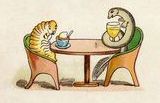By a 3-2 vote, the CPSC has confirmed that the absurd and inflexible Consumer Product Safety Improvement Act bans the sale of children’s products which contain components of conventional (leaded) brass. The vote drew dissents from commissioners Anne Northup (statement) and Nancy Nord (official comments, PDF; further statement at her blog). From the latter:
…The Commission has now very clearly determined that we do not have the flexibility under the law to make common sense decisions with respect to lead.
…I am especially concerned about what this decision means for our schools, where brass is found on desk hinges, coat hooks, locker pulls and many other items. Are schools now going to be forced to remove all brass and if so, who will bear this financial burden?…brass is found throughout a home and removing it from toys does little in terms of removing it from a child’s environment. If brass were really harmful to children, we would be taking action to remove it from the home but no one is suggesting that there is a safety issue that needs to be addressed in this way.
Evidence of actual health risks from brass in the everyday environments of American children is, of course, anything but compelling. Rick Woldenberg has been covering the story here, here, here, and here. Greco Woodcrafting predicts rough times ahead for school bands, as well. And the WSJ editorializes today.

More: this summer the CPSC issued guidance on the closely related topic of ballpoint pens (the roller balls of which include lead alloy); the upshot was so long as manufacturers don’t primarily market any given pen design as being for kids, they’re in the clear, even if large numbers of children are among the pens’ users. (Writing Instrument Manufacturers Association petition and response, both PDF; earlier here, here, etc.) For more on that episode, see 3 Green Angels, NAM “Shop Floor” and more, Rick Woldenberg and more, and Whimsical Walney.
PUBLIC DOMAIN IMAGES from Elise Bake, Der Ball Der Tiere (“The Animals’ Ball”, German, 1891), courtesy ChildrensLibrary.org.


14 Comments
[…] UPDATE: More from Walter Olson at Overlawyered.com, “CPSIA’s ban on brass.” […]
Stop the Death from Quilts and Food
I want to do my satirical part to promote safety by breaking the news about the ongoing dangers of preparing and eating food:
Food Related Illness and Death in the US
Sept 1999 – Centers for Disease Control and Prevention by Paul S. Mead and others
[edited] “We estimate that food borne disease causes about 76 million illnesses, 325,000 hospitalizations, and 5,000 deaths in the United States each year (1999).
——–
As fictional head of the US Food Protection Agency (UFPA), I have issued the following regulations to be implemented within one month. Space limits us to listing only a small selection here:
() All persons and especially children (APEC) should limit their intake of fresh food. If they must eat fresh food, frozen samples must be retained for later analysis in case of illness. A written food diary (FD) is required under penalties of SS 23, Para 12(b).
() Fresh food shall be boiled for 20 minutes before consuming, including all fruits, vegetables, legumes, meats, and “other”. This includes lettuce, tomatoes, and bread.
() Food that has been deep fried, canned, or pickled is generally considered safe, but the labels must be recorded in the FD (under the usual penalties).
() No restaurant, food pantry, warehouse, snack bar, food cart, church social, or home kitchen shall prepare food unless and until it receives an UFPA Inspection of Safety (UFPAIS), repeated at intervals of 3 months. Inspections will include a review of washing and sanitizing regimens, per SS 25, Para 3(c-f). The cost of inspections will be billed to the inspected site.
(There is more …)
As far as I can tell, the people behind CPSIA are secret members of a radical zero population growth group. If all the restrictions of the CPSIA are followed, it will be impossible to raise a child in the USA unless you keep your child naked in a warm cave lined with heavy metal-free marble and provide air purified with HEPA filters, distilled water (from a ceramic still), and organically grown food that isn’t fertilized with manure. Forget about toys, books, or computers: they contain toxins (that could kill a child if he ate twice his own weight in such things).
I don’t think it’s doing an iota of good exposing the insanity of the CPSIA. My impression is that the more ridiculous this law is seen to be, the more Congress digs in its heels and refuses to even acknowledge there’s any problem with it. Probably because to admit that it’s so flawed is to admit that they messed up in drafting it and none of them want to admit that.
Incidentally, this is why bipartisanship is vastly overrated. The CPSIA was passed through a rare, harmonious act of bipartisanship and the result was a completely messed up law and a situation where almost no-one in Congress wants to admit that the law isn’t perfect. At least if this had been a partisan law, the other party could be counted on to take up the cause against it.
For GregS:
CPSIA was not a drafting error. It reflects the compete ignorance of risk science by Western Society that passes through our lawmakers.
We are spending a half billion dollars dredging the Hudson River to eliminate PCB’s even though the level of PCB’s in the river will be no lower twenty years from now than if nothing were done.
A neighbor has a bed bug infestation that could be dealt with effectively, cheaply, and safely with DDT. But there is a stupid ban on DDT that makes a bed bug infestation an expensive nightmare.
Governor Cuomo said on the Leon Charney program that he favors Nuclear Power. His Shoreham decision cost New York State five and a half billion dollars, because of some moronic idea that the location was unsafe.
This is crazy. Do these people have any understanding of science? What will the government do next, ban CO2? Oh, wait!
I have to admit GregS has a very good point. The problem isn’t so much with CPSIA as with a Congress so arrogant and removed from real life as to think that either this law actually does keep children safe without harming any business that wasn’t already doing evil, or that the burdens it places on ordinary men and women aren’t so large as to do damage that other, smaller people can’t clean up for them. Congressmen and women that truly believe these things will never act to help us plebes. What else can we do but remove them from office?
Congress gets an “F” in metallurgy and basic common sense! Lead (~2%) is added to brass (a zinc/copper alloy) to make it “free-machining” (i.e. optimal cuttability at high speeds with machine tools). Leaded brass is not dangerous, even to children. Even leaded water supply parts and fittings which some say should probably be made from lead-free brass (no greater than 0.25% Pb) present no problems especially if the first second’s worth of water from the faucet is not used for potable purposes. Most brass purchased by specification is not “leaded brass.” In other words, if you specify what’s in it you get what you order. If one buys “junk brass,” he gets an unspecified alloy likely to contain some lead, since leaded brass isb inevitably included in the melt.
This “junk brass” is used in appliations where strength, corrosion resistance and other properties do not need to be tightly controlled. Keys and outdoor padlocks are such applications. Most people in-the-know thought California went off the deep end when they banned keys made from leaded brass or junk brass. For some reason, CA now requires brass keys to have less than 1.5% lead.
Let us look at the bright side–getting rid of most of the school brass is a very good thing.
What we don’t pay in salaries to Supervisors, Administrators, and on and on, we can give back to the taxpayers, or use to buy equipment, or ……
I wonder how they test wooden baseball bats for children. Given that each one comes from a different tree, I would think they would have to test each bat and provide a certificate of compliance. And then all of the other toys/objects made from substances which can vary from piece to piece. Essentially everything made from wood or other natural materials that does not come out of a factory in a large batch.
What a mess!
“Are schools now going to be forced to remove all brass …”
Of *course*.
“… and if so, who will bear this financial burden?”
Most likely property owners in the school districts.
Does anyone have an idea on how this impacts “brass” musical instruments which are marketed to children?
Frank,
We can only hope this means the end of middle-school band concerts.
Actually, while you’re correct that it was passed in a bipartisan process, the Republicans seem to have realized that the law was rushed and is badly flawed, and are making the right noises about changing it. But they’re a tiny minority, and the majority Democrats have made it clear that no changes are forthcoming.